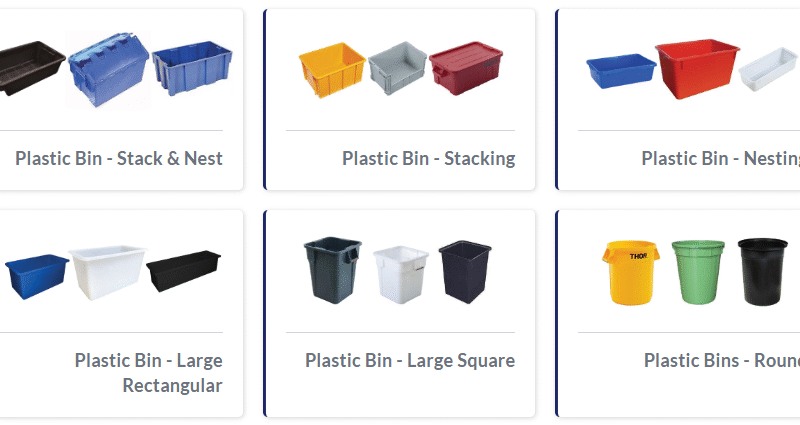Boosting Supply Chain Efficiency with Industrial Plastic Bins and Stackable Plastic Crates
A supply chain is only as strong as its weakest link. From raw material handling to the delivery of finished products, every stage must operate seamlessly to ensure efficiency, reduce costs, and meet customer expectations. Among the many tools that support these operations, industrial plastic bins and stackable plastic crates have emerged as indispensable assets. Their durability, space-saving design, and eco-friendly benefits make them essential for modern supply chain management.
The Evolving Demands of Supply Chains
Global supply chains today face increasing challenges: rising transportation costs, stricter environmental regulations, and the need for faster delivery times. Businesses must adapt by integrating solutions that optimize efficiency and reliability.
Traditional packaging materials such as cardboard and wooden crates are no longer sufficient. They fail to meet the demands of long-distance transport, high-volume handling, and sustainability goals. This is where industrial plastic bins and stackable plastic crates prove their worth.
Improving Logistics with Durable Packaging
Transportation is one of the most critical aspects of supply chain management. Goods may travel thousands of kilometres across various modes of transport before reaching their final destination.
- Industrial plastic bins are designed to withstand rough handling, extreme weather, and exposure to chemicals.
- Stackable plastic crates provide stability during transport, ensuring goods remain intact even in crowded or high-vibration environments.
The durability of these containers reduces product loss and damage, saving businesses from costly returns and replacements.
Streamlining Storage and Distribution Centres
Distribution centres are high-pressure environments where efficiency is key. Workers must move, sort, and dispatch goods quickly while keeping track of inventory.
- Stackable plastic crates allow for organized stacking, making it easier to identify and access items.
- Industrial plastic bins can be integrated into automated storage and retrieval systems (ASRS), streamlining processes and reducing human error.
- Nesting features reduce empty crate volume, maximizing warehouse space.
By adopting these solutions, supply chains can cut labour costs and improve turnaround times.
Enhancing Worker Productivity and Safety
Supply chains involve extensive manual handling, from loading trucks to sorting packages. Poorly designed packaging increases the risk of injuries, slows down processes, and leads to inefficiencies.
- Industrial plastic bins are ergonomically designed, lightweight, and easy to carry.
- Stackable plastic crates minimize clutter and create safer workspaces by preventing spills or collapses.
This translates into reduced workplace accidents and higher employee productivity.
Supporting Sustainability Goals
Sustainability is no longer optionalit is a key expectation from regulators, customers, and business partners. Traditional packaging materials generate excessive waste and contribute to deforestation or landfill problems.
- Industrial plastic bins and stackable plastic crates are reusable for years, reducing waste streams.
- At the end of their lifecycle, they are recyclable, contributing to circular economy practices.
- By reducing dependency on single-use packaging, businesses can demonstrate their commitment to eco-friendly operations.
Sustainable practices not only reduce environmental impact but also improve brand reputation.
Cost-Benefit Analysis: Why the Investment Makes Sense
While the upfront cost of industrial plastic containers may be higher than cardboard or wooden alternatives, the long-term savings are significant.
- Lower replacement costs: A single industrial bin can outlast dozens of cardboard boxes.
- Reduced losses: Stronger protection minimizes damaged goods.
- Optimized transport: Nesting and stacking features reduce shipping costs by maximizing truckload efficiency.
- Compliance benefits: Meeting hygiene and safety standards prevents costly fines or recalls.
The return on investment is clear, especially for large-scale supply chains managing thousands of products daily.
Versatility Across Industries
The applications of industrial plastic bins and stackable plastic crates span virtually every industry that relies on supply chains:
- Retail & E-commerce: Efficient handling of high-volume consumer goods.
- Automotive: Safe storage and movement of heavy mechanical parts.
- Food & Beverage: Ventilated crates to preserve freshness of perishable goods.
- Healthcare & Pharmaceuticals: Hygienic, washable bins for sensitive items.
- Manufacturing: Bulk handling of raw materials and components.
Their versatility makes them one of the most valuable tools in any supply chain manager’s arsenal.
Conclusion
Efficiency, durability, and sustainability are the cornerstones of modern supply chains. By incorporating industrial plastic bins and stackable plastic crates, businesses can reduce costs, streamline operations, and improve worker safety. Their ability to withstand rigorous handling, save space, and align with green practices makes them a strategic investment for any organization.

